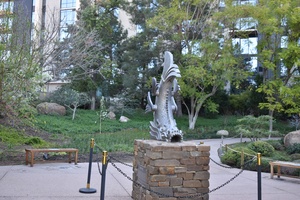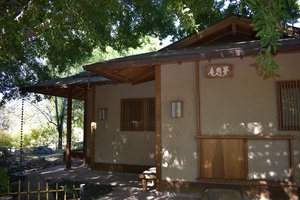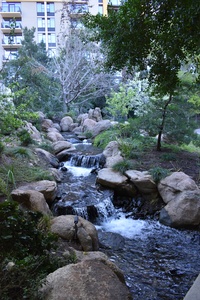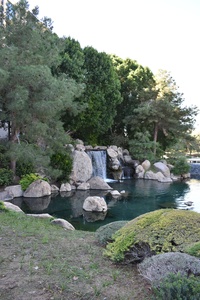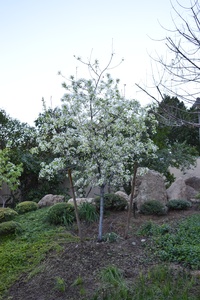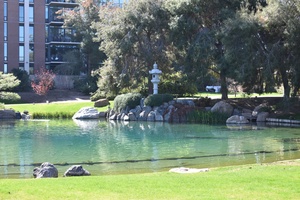The Japanese Friendship Garden (RO HO EN)
Located by N 3rd Ave. and W Latham St., and next to the Margaret T. Hance Park in the downtown area of Phoenix, Arizona.
A spacious parking lot is available for attendees.
-------------------------
Name chosen by its creators.
鷺RO, the Japanese word for Heron — the symbol of Himeji City
鳳HO, the Japanese word for the Phoenix bird - what the city of Phoenix was named after
園EN, the Japanese word for garden.
Mission:
Their mission of the Japanese Friendship Garden, is to have the Japanese garden be available for those who want to come through maintaining its beautiful nature and structure. The two cities participate in business, governmental, cultural and educational exchanges which promote understanding and friendly ties. Phoenix and Himeji want to continue their long lasting relationship for years to come. The two cities of Phoenix and Himeji exhibit their cultural vision through the garden. The heart of Phoenix location provides educational/artistic programs and events that will help to continue, celebrate and deepen our relationships in the rich history and culture of Japan.https://www.japanesefriendshipgarden.org/about
The Japanese Friendship Garden of Phoenix, Inc. is a non-profit 501(c)(3) organization governed by a Board of Directors.
Importance to the Community:
The Japanese Friendship Garden allows an epicenter for Japanese culture and history to unite with Phoenicians. The garden serves as bliss for many people upon which meditation and concentration can be available for those who try. Weddings, Photoshoots and corporate functions can rent out the gardens to host events.
+There are Covid-19 limitations which include events must have less than 50 people including vendors, mask mandate, social distancing etc.
https://www.japanesefriendshipgarden.org/rentals
History:
Phoenix, Arizona has worked in part with their sister city of Himeji, Japan to create this five phase project together. This projects idea came in 1987 when the mayor of Himeji, Matsuji Totani wanted to cement the bond of their two cities and their countries together. The creation of the tea house was apart of the first phase completed in November 1996, which was also the 20th anniversary of the Sister City relationship. The whole project took thousands of hours of planning, designing, constructing. The phase two of the garden being created was finished in January 2004, which the koi fish were presented in dedication to the building of the garden. In 2008 phase three was the building of the restroom which brought back the Himeji architects to complete the building. In November 2016, there was a ceremony to celebrate the 40th anniversary of the Sister Cities. They hope to fully complete the five phase project in the near future, which include a viewing pavilion and visitor center. They hope people will continue to take away peace, tranquility and friendship.https://www.japanesefriendshipgarden.org/about
Events:
They hold many cultural and education events that enhance visitors understanding of traditional Japanese culture. Some of their seasonal and regular events include the Yoga, tea ceremonies, Moonviewing Festival and a spring celebration. The Moonviewing Festival is a festival honoring the harvest full moon, which is their most popular event. The authentic tea ceremonies are very rare throughout America, so this offers a unique experience to the Valley of the Sun. These tea ceremonies are offered to the public each month, from October to June. These seatings are by reservation only and guests are provided a guided tour of the teach house before they begin. The tea ceremonies last one hour and seatings are limited and fill up fast.https://www.japanesefriendshipgarden.org/teaceremony
Tea Ceremony Admission:
-
$35.00 per seating
-
$30.00 for seniors (62+) and Garden Members
+There are Covid-19 limitations which include no tea ceremony events will be planned at the time being. There are still some socially distanced events occuring onward.
Garden Features:
The Japanese Friendship Garden is Arizonas first authentic public Japanese garden with 3.5 acres of peace which they hoped its design would help with meditation and contemplation. When you enter the property you are invited to walk through the loop path which takes you through The garden features a 12-foot waterfall that continuously streams into the pond. The water was a symbol of purity and happiness which captured the gardens essence. There are over 300 koi (known as the jewels of fish) that inhabit the pond, the koi symbolizes the spiritual abundance and advancement. There are also a hand-picked cobblestone beach, over 50 varieties of plants, some cherry trees, and a tea house, a tea garden and sculptures. Many of the sculptures and lanterns were gifted from Himeji, Japan and exported to Phoenix. After walking through the garden guests can enjoy the gift shop where many of the items are hand picked from Japan. There is also a restroom available that was made with Japanese-style architecture created by Himeji architects. https://phoenix.org/japanese-friendship-garden/
Visiting:
People will usually spend 30 minutes to an hour, so make sure to plan accordingly, although guests can spend as long as they would like during open hours. The last entry into the garden is at 3:30 P.M. There are walk-in tours available every Wednesday for an additional cost to learn more detail about the design work and background. They can last 30-50 minutes and a maximum of 10 people is allowed while following Covid-19 guidelines.
Wednesdays
1:00pm and 2:00pm
$5.00 + Admission Price
https://www.japanesefriendshipgarden.org/questions
Rules:
Quiet reflection upon the natural beauty is a must for a relaxing induced time.
1) Stay on the Path
Do not go anywhere where there is no path, children must be supervised at all times.
2) No Unauthorized Photography
You must reserve a photo shoot, pay the fee and sign an agreement in advanced to take photography of the garden unless its a candid picture and not professional. Check photo policy for more information.
3) No Outside Food or Drink
Please do not bring in food or beverages, they want to keep the garden as clean as they can constantly.
4) No Pets
Pets are not allowed unless that pet is a service animal.
5) Keep it Tranquil
Please keep calm and quiet as you walk through the garden on the path.
Hours:
Tuesday to Sunday
10:00AM - 4:00PM
Closed on Mondays
Admission Prices:
General: $10
Seniors (62+): $8
Students/Military: $7
Children 6 and under: Free
Contact Information:
1125 N. 3rd Avenue,
Phoenix, Az
85003
602-274-8700
Donate:
The Japanese Friendship needs your support to continue to grow and prosper.
Plant donations are also welcome, there is a list available of plants you can donate to help contribute to the changing landscape of the garden.
https://www.japanesefriendshipgarden.org/plantdonations
There are also volunteer opportunities for those who are interested.
https://www.japanesefriendshipgarden.org/volunteer
Memberships are also available which helps the garden prosper. With a membership one can pay a one time annual price and be able to use the benefits of one such as: restaurant discounts, gift shop discounts, guest passes, invitation to special events etc.
https://www.japanesefriendshipgarden.org/membership
References:
About the garden. (2020). Retrieved February 19, 2021, from https://www.japanesefriendshipgarden.org/about
[email protected]. (2021, January 28). Japanese friendship Garden. Retrieved February 20, 2021, from https://phoenix.org/japanese-friendship-garden/
Welcome To RoHoEn - The Japanese Friendship Garden of Phoenix [Video file]. (2020, October 8). Retrieved from https://www.youtube.com/watch?v=P7Ei_M3vncc


